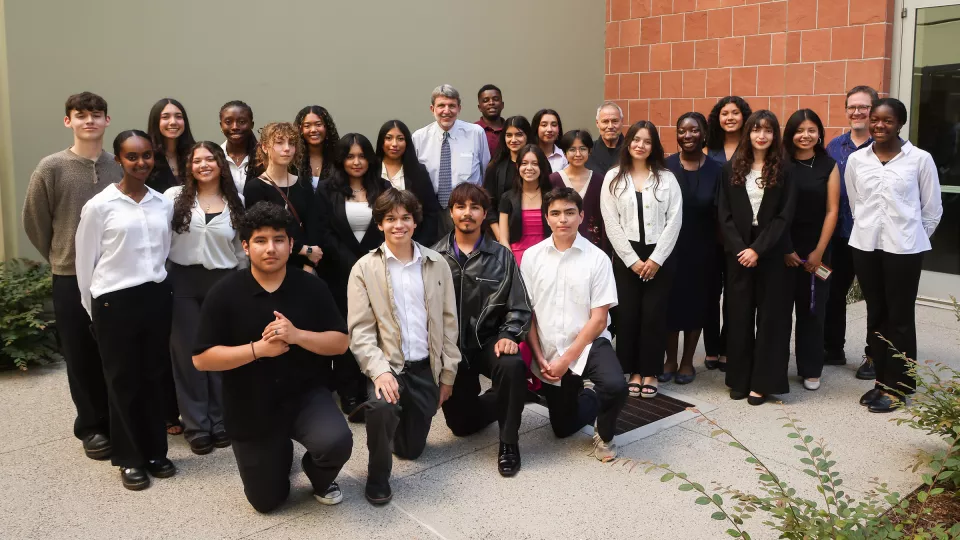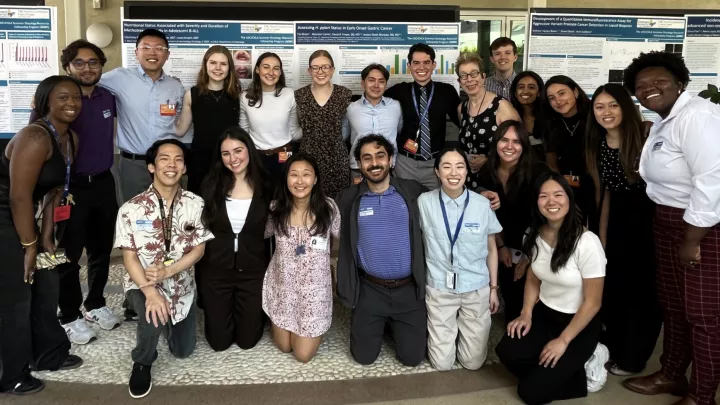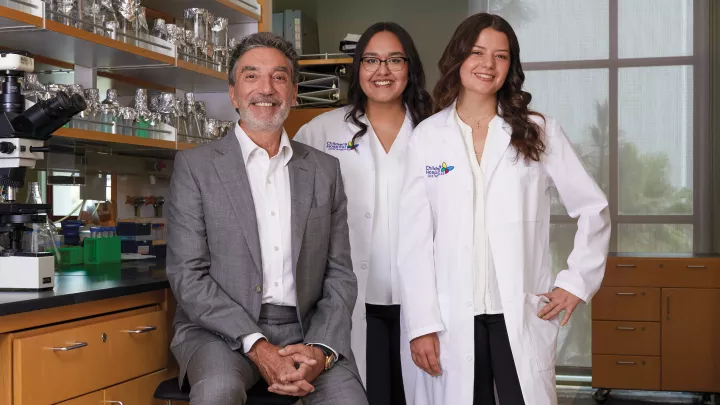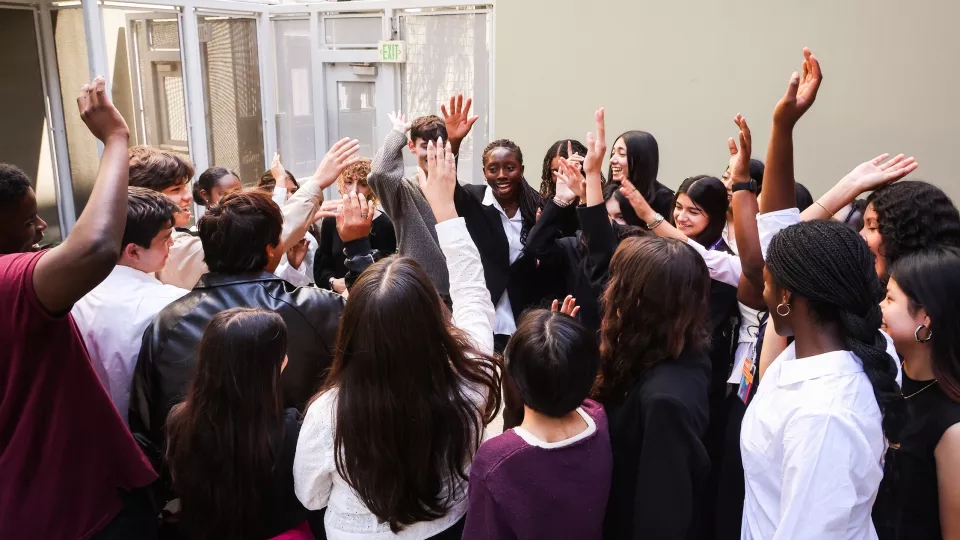
Samuels Family Latino and African-American High School Internship Program (LA-HIP) participants ramp up their excitement before presenting their research at the 2024 LA-HIP symposium.
Laboratory Internship Program Teaches High Schoolers the Art and Science of Medical Research
To close out her internship, Michelle De La Cruz faced arguably the toughest scientific question of the summer: “How do I condense seven weeks of lab research into a five-minute presentation?”
“It’s a whole summer’s worth of work, so we want to explain everything that we did in detail, but we can't, so we just have to jam pack it,” says Michelle, a new graduate of the 2024 class of Samuels Family Latino and African-American High School Internship Program (LA-HIP) at Children’s Hospital Los Angeles.
On Friday, Aug. 2, Michelle and her lab partner Sophia Meraz completed their final task admirably, delivering a “lightning round”-style presentation alongside 22 of their peers for a packed auditorium of CHLA faculty, parents, family members, friends and teachers.
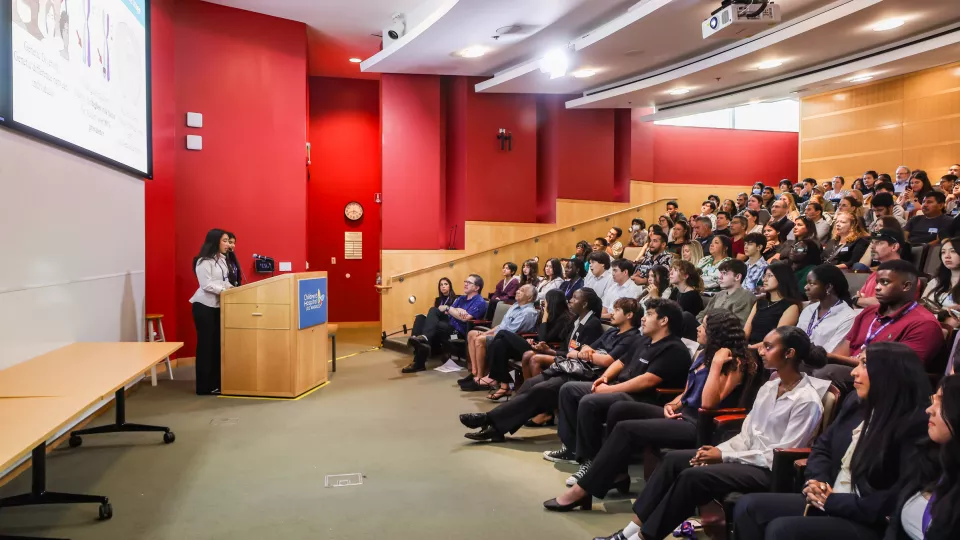
For 19 years, LA-HIP has empowered rising high school seniors who identify as an underrepresented minority in STEM to participate in hands-on laboratory-based research at CHLA. The program’s ultimate goal: To develop and nurture the next generation of scientists and physician-scientists.
As the first student at her high school to participate in LA-HIP, and the first in her family to pursue a career in the medical field, Michelle was pleasantly surprised when she found out she’d been accepted to the program.
“I first became interested in STEM in elementary school,” Michelle says. “A lot of my family members wanted to become doctors, and unfortunately they didn’t have the opportunity to further their education. So now I'm here doing that.
“It’s really amazing and inspiring to be here because I get to share what I'm doing at CHLA with younger kids in my area and say, ‘Hey, if you like science, you can come here too.’”
Diving head-first into research
Once students are accepted into the program, pairs of interns are assigned a faculty scientist mentor at The Saban Research Institute (TSRI) of CHLA. For seven weeks, interns work full-time in that scientist’s lab, contributing to research across a variety of disciplines from regenerative medicine to cancer to neuroscience.
Students were asked to choose three fields of interest as part of their application—but for Michelle, there was really only one true choice: neuroscience. “I fell in love with the field at an early age,” she says, “and I made that known in my application.”
Entering their first day at TSRI, the interns still hadn’t received their assignments, Michelle recalls. Then she was introduced to her mentor, Manal Tabaa, PhD. As they walked to the lab together, Michelle casually asked Dr. Tabaa what her lab focused on.
Dr. Tabaa’s answer: neuroscience.
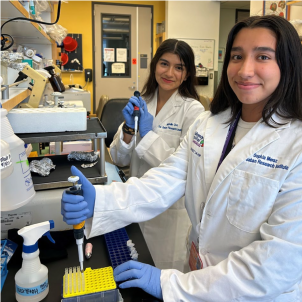
“My lab partner Sophia and I turned to each other, and we were almost going to cry,” Michelle says, “It was so exciting!”
During their time at TSRI, Michelle and her peers learned cutting-edge techniques and methodologies not typically taught until college or graduate school. They also practiced the art of keeping a lab notebook, writing scientific abstracts, interacting with other scientists, and presenting their research—which culminated in their symposium presentations on Aug. 2.
Michelle and Sophia’s research explored a gene mutation called CDH8 which has a high association with autism spectrum disorders. They measured gene expression between two different strains of CDH8 to explore how genetic diversity affects that gene expression. “A lot of neuroscience studies do show diversity, but not specific genetic diversity,” explains Michelle. “We wanted to find out how genetic differences change the way people exhibit certain behaviors.”
“What’s special about this program is that students’ research is part of the overall program of the laboratory, which means they’re an active participant in making scientific discoveries and advances,” says Dannie Nunez, Program Administrator at LA-HIP.
Cultivating college readiness
Michelle’s experience in the lab has only strengthened her passion for pursuing an education and career in neuroscience. “This type of research is definitely something I want to continue. I feel really drawn to the behavioral and psychology side of neuroscience,” she says.
On top of the hands-on laboratory experience, students participate in college counseling sessions, complete an SAT prep course and attend field trips to local college campuses. To ensure participation is equitable and accessible for all students, the program also provides a cash stipend, an LA Metro card and meals at the hospital cafeteria.
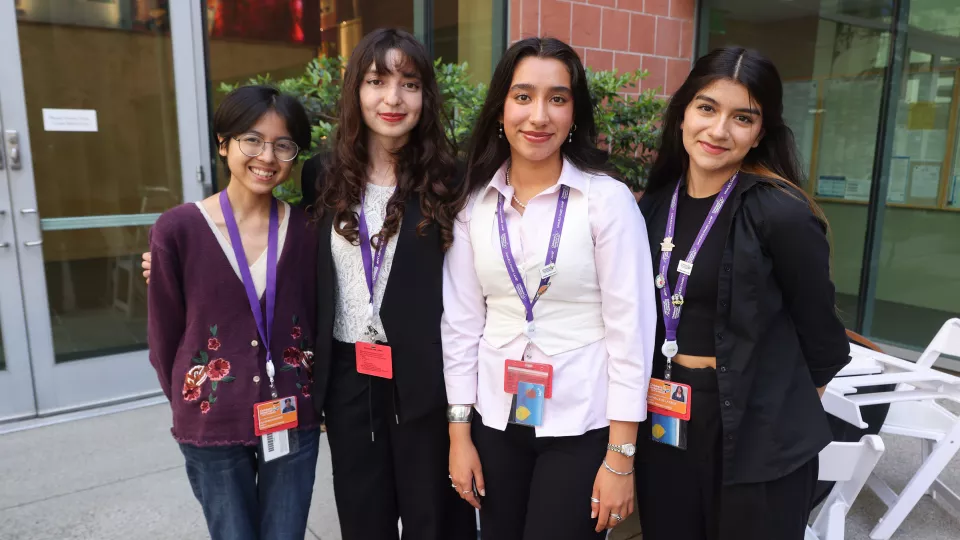
Dreaming bigger
At the symposium, Mark R. Frey, PhD, Director of LA-HIP, shared that of 270-plus students who have participated in the program over the last two decades, all have gone on to enroll in a four-year institution, and many have gone on to pursue careers in science and medicine. “We have PhDs and MDs among our graduates, and our alumni come back proudly to celebrate with us,” said Dr. Frey.
Before their presentations, the students heard from one such alum who graduated from LA-HIP in 2017. Since then, he’s participated in research at several leading institutions and has recently been accepted to medical school. He closed his presentation by mentioning how much he looks forward, someday, to joining the faculty at CHLA.
“I feel like I genuinely have the chance to go to a dream school of mine now,” says Michelle, reflecting on her experience. “A lot of first-generation students in East LA—students like me—don't get to pursue their education further on. It’s been really nice to be able to have this preparation.”
“I joke that this is the most depressing day of the year,” says Dr. Frey. “We’ve seen 24 students really blossom and advance their understanding of how to do research, learn to become a cohort with one another, learn a lot of things about themselves, and just bring a lot of energy and joy to the institution. We’re delighted that they've made it this far.... But then on Monday, they're not here anymore.”
“The amount of enthusiasm and the level of the questions that students bring to me and their mentors have been so impressive,” adds Dr. Frey. “These are future leaders. Absolutely no doubt.”
